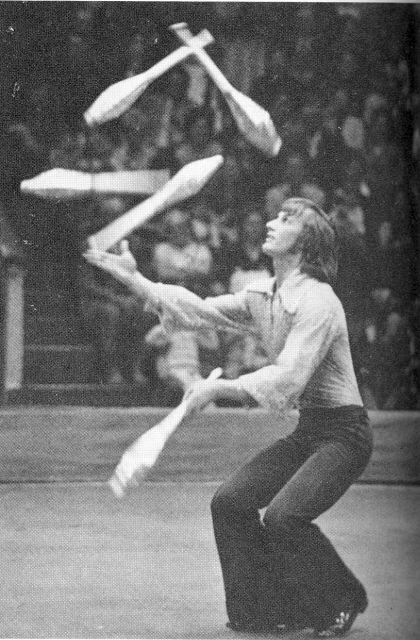
Ignatov, winner of the Berlin International Youth and Student Festival, 1979. |
Page 20 Winter 1990 - 91
|
"What's Most Important" by Sergei Ignatov
Ignatov Tells His Story of Discipline & Desire - Part I Translation by Christopher Majka from an article in a Soviet circus magazine. Photos courtesy of Karl-Heinz Ziethen.
This
morning I awoke a few minutes before
my alarm. While I was trying to guess the time the clock rang.
Seven
o'clock - my working day begins. I get up and drink a glass of hot
water or rosehip tea with honey.
I
spend about an hour warming up. I pay attention to all my muscles
and try to loosen any that are tight from yesterday's work. Today my
head is clear and I feel well. My body is ready and my muscles are
relaxed, testifying that yesterday I did everything well. My work
was not in vain.
Only
a daily program of exercise and rest allows a person, over a short
period of time, to renew strength. My muscles are rested, relaxed
and ready to undertake new work. I have a light breakfast and head
out to the circus.
For
20 years I've been in it and it's in me. Time reduces, extols,
cleans, erases and puts everything in its place. It gives us the
possibility to understand the present, reflect on the past and look
toward the future - thinking beyond the present and transient. About
some they say - "they were," about others - "they
were and are," and about others yet - "they were, are and
will be."
From
the district with the school we always ran to the circus on Tsvetnoi
Boulevard, no. 13. We admired the exceptional technique of Alexander
Kiss.
Sigmund
Chemyauzkaz was an enigma. Then we understood his astonishing human
qualities. It seemed to us that we, like his contemporaries, could
call him "Sig." The equestrian juggler Nikolai Olkhovnikov
worked lightly with a sense of irony toward all those around him. He
juggled well but the most important thing for Olkhovnikov was always
himself.
We
liked the circus. We might not understand everything but we were all
crazy about Edward Abert and Leonid Yengibarov. Abert didn't work in
the ring, he lived in it. He thought in juggling clubs and was their
poet. He became a unity with them and each time he performed he was
different. He could do it all: smile, move, stop and, of course,
juggle like no one else. One day his work could be inspired, the
next day mediocre but he never tried to deceive us. And in whatever
he did in the ring we could sense his talent and his nature.
As
spectators we already started to see the circus not just as a
marvel. There awoke in us a need for a contact between spectators
and performers. The circus started more and more to signify artistry
and its exponents were the performers.
We
wanted to juggle like Alexander Kiss, ride horses like Nikolai
Olkhovnikov and climb the ladder like
Sigmund Chernyauzkaz. And above all we dreamed of becoming
Aberts or Yengibarovs. And we worked. Our first year at circus school
came to an end.
I'm
riding on a train from Simferopol to Sverdlovsk. In the wagon beside
me and my grandfather, Ivan Petrovich Ignatov. are three horses from
the Teplovi juggling routine. My grandfather worked as their handler
and groom and I went to visit him regularly in one city or other for
my three month vacation. Their appearance in Simferopol had come to an
end and now we were headed for Sverdlovsk in a freight car.
My
grandfather was the first branch on what is today becoming a circus
family tree which, it seems, is not about to wither. He was then
almost 70 and I was only 16.
The train rattles - my grandfather sits on a sack of oats. He smacks his burnt lips and sips lime-coloured tea, gathered by me, from a glass. He was born in the deep wilds around Voronezh. He speaks with a backwoods accent saying: "I look across the threshold of the door and out jumps the sun." There he sits, and his bald head shines like the sun in the comer of the wagon. The chains rattle to the rhythm of the rails. The planks on which the horses stand creak. Sometimes a horse neighs. But even when we're both silent the wagon feels full of warmth. Today, after many years, I want to call all that romantic. I experienced it and at the time I wanted that journey to last forever. Today I dream that I could repeat it. |

Ignatov, winner of the Berlin International Youth and Student Festival, 1979. |